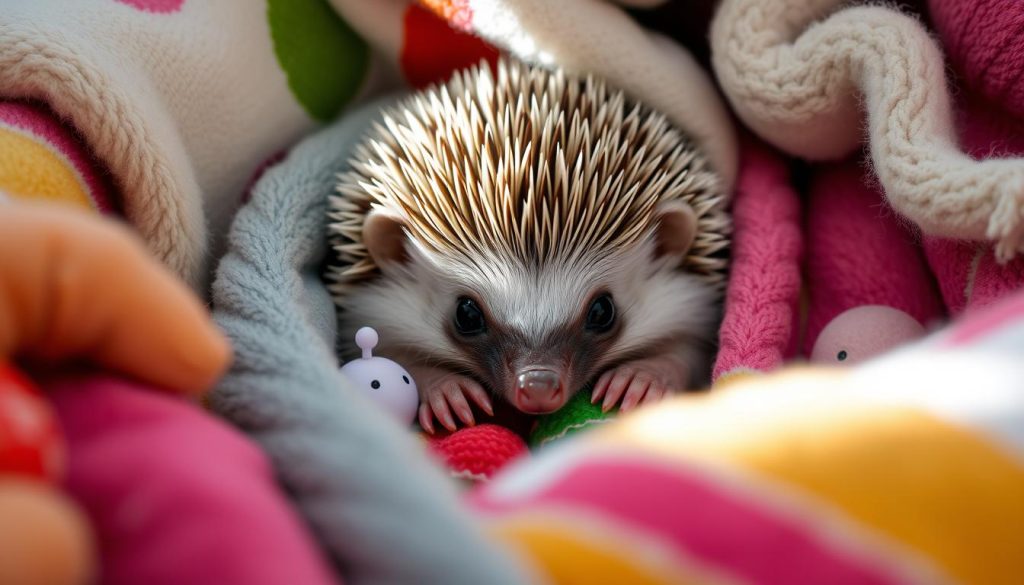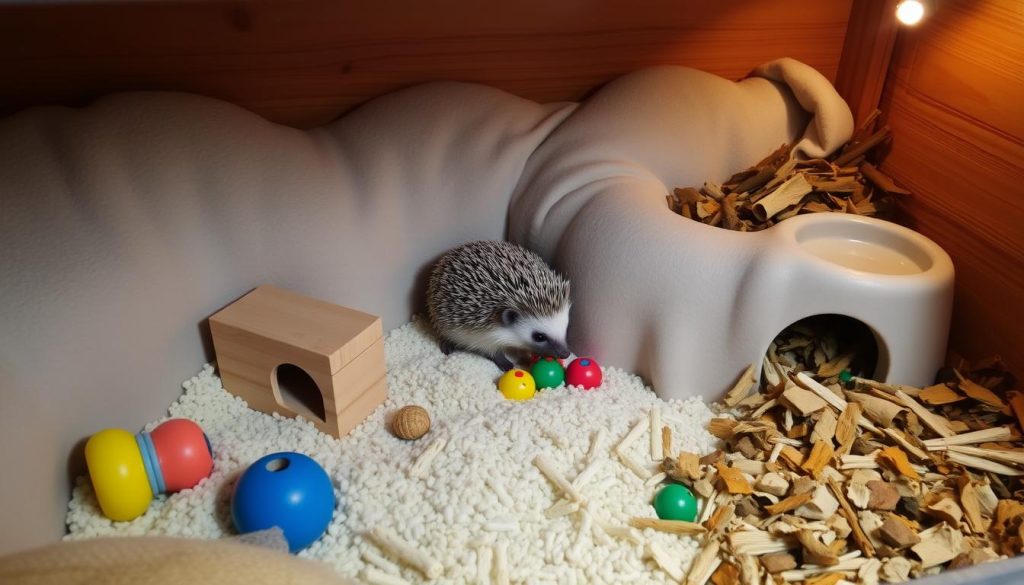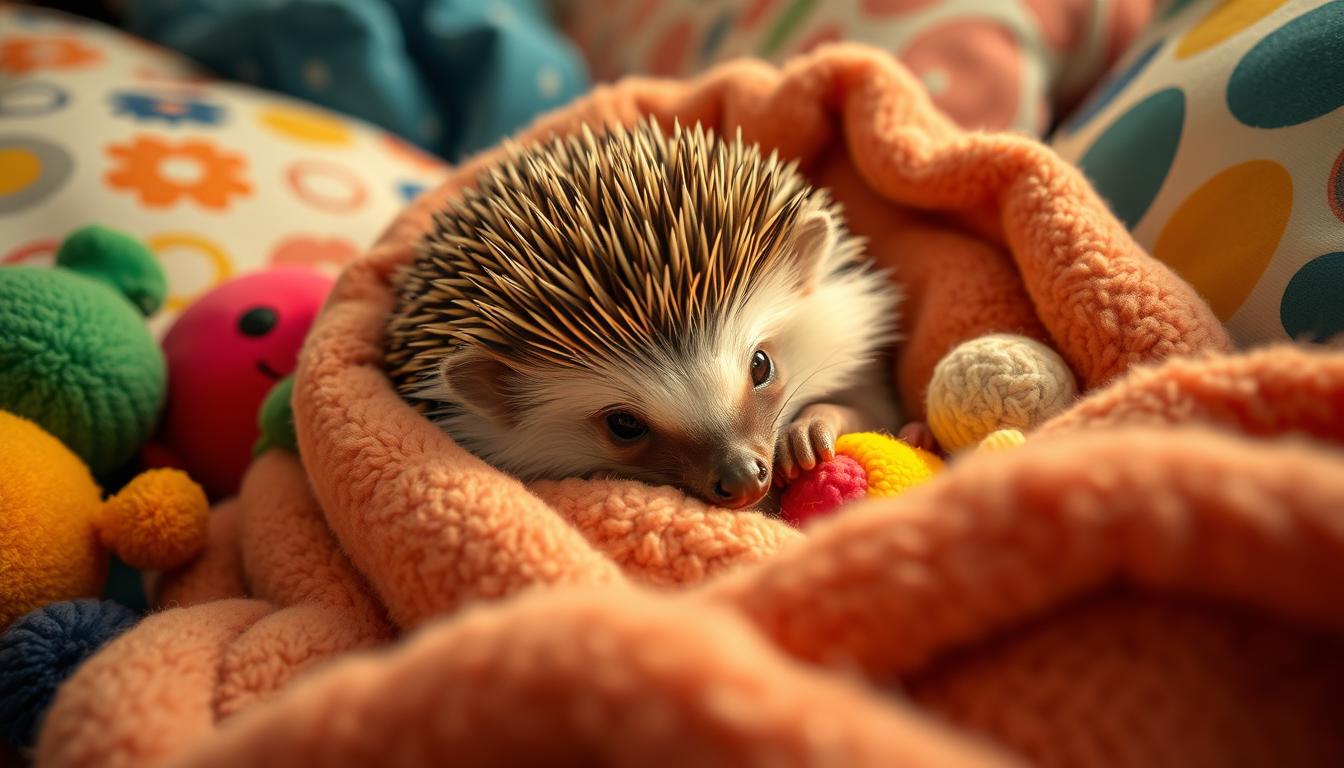You’re looking for an adorable and unique pet, aren’t you? Just imagine the adorable hedgehog! These small, spiny animals are becoming increasingly popular pets. They have some quirks, but they are really cuties. If you plan to have one, you should learn about caring for hedgehogs.
In this article, we will discuss everything about hedgehog care that you have to know. We’ll talk about how to pick the right species, make a good home for them, and feed them right. You’ll learn what to feed them, how to handle and socialize them, and how to tell if they are happy or not feeling well.
We will also discuss the most prevalent health-related issues and why your pet must see a vet. After you’re done reading this, you will be ready to show love and take care of your hedgehog! Get your new hedgehog pet prepared for a huge adventure!
Key Takeaways
- Unique and charming exotic pets with quirky personalities are hedgehogs.
- A happy and healthy pet hedgehog depends on knowledge of their particular care needs.
- The entry of a right hedgehog species depends on fit for your way of life.
- Hedgehog care depends mostly on building an appropriate habitat and offering a balanced meal.
- Preventive veterinary treatment, socializing, and regular handling help your hedgehog to flourish.
Introduction to Hedgehogs as Pets
Adorable appearance and distinctive personality, hedgehog pets are growing in appeal as housemates. Originating in Asia, Africa, and Europe, and make great companions. You should educate yourself on hedgehog behavior, lifespan, and varieties before bringing one into your home as a pet. This information facilitates your proper care for them.
A hedgehog pet is largely nocturnal and sleeps a lot during the day. As the owner, you must allow them to sleep without disturbing them. They are also solitary, preferring to be alone, and living around other members of their species can stress them out. So it’s a good idea to keep them separate.
Though not your usual cozy pet, hedgehog pets may develop close relationships with their owners via regular engagement and appropriate socialization.
Usually living between 4 and 6 years, pet hedgehogs might survive up to 8 years under careful care, so be ready for a significant dedication.
There are several hedgehog species kept as pets, and their personalities can vary quite a bit:
- African Pygmy Hedgehog: This is the most common pet hedgehog, characterized by their small size and friendly nature.
- European Hedgehog: European hedgehog pets are bigger than African Pygmy Hedgehogs and are more timid.
- Long-eared Hedgehog: With its elongated ears, this hedgehog pet is found in the Middle East and Central Asia.
| Species | Average Size | Temperament |
|---|---|---|
| African Pygmy Hedgehog | 6-8 inches | Friendly, social |
| European Hedgehog | 8-10 inches | Reserved, independent |
| Long-eared Hedgehog | 6-8 inches | Curious, active |
Learn what attention a hedgehog needs before you decide to keep one. The many species call for varied homes, food, and management. Learning these will equip you to provide a good life for your new hedgehog at home.
Choosing the Right Hedgehog Species
Finding the appropriate species is essential when considering keeping a hedgehog as a pet. Your experience level and way of living will determine it. Three types of hedgehogs are commonly maintained as pets: the African Pygmy Hedgehog, the European Hedgehog, and the Long-eared Hedgehog. Their legal rules, care requirements, and characteristics differ as well.
African Pygmy Hedgehog
African Pygmy Hedgehog, in terms of being tameable and simple to maintain at home, the African Pygmy Hedgehog comes highly on the list. Originally from central and eastern Africa, they have spent many years cultivated in captivity. This qualifies them as wonderful pets.
Living 4-6 years with appropriate care, this hedgehog pet weighs between 300 and 500g. Low-maintenance animals require a good feed, a big cage, and constant human attention to stay sociable.
European Hedgehog
Found across Europe, Asia, and some of Africa, the European Hedgehog is bigger than the African Pygmy Hedgehog. Though they may be pets, they demand more care than African hedgehogs.
Being a protected species, several nations, like the United States, forbid keeping European hedgehogs as pets. If you are thinking about having one, make sure to verify the rules in your region; certain locations may forbid owning one, and you should also consider whether you have the particular means to support one.
Long-eared Hedgehog
Less often kept as pets are Indian Hedgehogs, usually known as Long-eared Hedgehogs. From the Middle East and Central Asia, they have long ears. It is this that distinguishes them.
Being active calls for a high protein diet and a spacious cage. Sometimes they are more challenging to socialize with and manage than the African Pygmy Hedgehogs. They are therefore ideally suited for people who have past experience caring for hedgehogs.
| Species | Size | Lifespan | Care Level |
|---|---|---|---|
| African Pygmy Hedgehog | 300-500 grams | 4-6 years | Low to moderate |
| European Hedgehog | 800-1,200 grams | 5-7 years | High |
| Long-eared Hedgehog | 400-600 grams | 4-7 years | Moderate to high |
Preparing Your Home for a Hedgehog Pet
Get your house ready before you bring your new hedgehog home. You need to take care of them and make sure they are safe. Setting up a nice home for your hedgehog pet and getting everything it needs are part of this.

Creating a Suitable Habitat
Consider size, temperature, and how readily you might enter the cage for your hedgehog’s residence. Your hedgehog will have much room to roam about and play in a big, solid-floor cage. Make sure they have a cozy and comfortable area to hide in, should they get afraid or want to be left alone. Also, depending on a proper exercise wheel, it keeps your hedgehog pet in good health and stops weight gain. Keep things neat and easy cleanup by keeping a litter box.
Essential Supplies for Your Hedgehog
You’ll also need important supplies to keep your hedgehog pet comfortable and entertained. These include:
- High-quality food and water dishes
- Soft, absorbent bedding material
- A heating source to keep the temperature right between 72-80°F (22-27°C)
- Enrichment items like toys and tunnels for their brain
- Nail clippers for regular grooming
- A travel carrier for vet visits and emergencies
Make sure they’re also safe and sturdy when choosing accessories for your hedgehog pet. Steer clear of anything with tiny bits or sharp angles that can damage them. Inspect and replace any damaged or “worn-out” accessories often to keep your hedgehog safe and content.
| Essential Hedgehog Supplies | Purpose |
|---|---|
| Cage with solid floor | Provides a safe and comfortable living space |
| Hiding spot | Offers privacy and security |
| Exercise wheel | Promotes physical fitness and prevents obesity |
| Litter box | Encourages cleanliness and easy cleaning |
| Food and water dishes | Provides access to fresh food and clean water |
| Bedding material | Ensures comfort and absorbs waste |
| Heating source | Maintains optimal temperature for hedgehog health |
| Enrichment items | Offers mental stimulation and prevents boredom |
If you tidy your house and gather the proper tools, your new hedgehog friend will greet you kindly. Ultimately, well-kept, respectable surroundings and appropriate accessories guarantee your hedgehog pet is healthy and happy. It’s all about bestowing upon them the life you can afford.
Hedgehog pet Diet and Nutrition
Part of caring for your hedgehog pet is providing a healthy, balanced diet. The best hedgehog diet for a hedgehog consists of high-quality food and treats such as insects, fruits and vegetables.

The key is selecting the right hedgehog food. It needs to be high in protein, low in fat and absolutely stuffed with vitamins and minerals. Treats like:
- Mealworms
- Crickets
- Waxworms
- Dubia roaches
Additionally acceptable are fresh fruits and vegetables. The following are some possibilities:
| Fruits | Vegetables |
|---|---|
| Apple (no seeds) | Carrots |
| Banana | Sweet potato |
| Blueberries | Squash |
| Melon | Bell peppers |
Treats can add variation to your hedgehog’s diet, but don’t overindulge. Many treats can lead to health issues, including obesity. Take great care with your giving.
“A nutritious and balanced diet fuels a healthy and happy hedgehog. By offering a good quality hedgehog food, insects & fresh water, you can be sure that your spiny pal has all the nutrients he needs to fight fit.”
Avoid giving your hedgehog dairy, chocolate, fatty meats, or sugary foods. These can harm their health. Make sure they always have fresh water and clean their dishes every day.
By sticking to these tips, you can help your hedgehog stay healthy and happy. Always talk to your vet if you’re worried about their diet or if their eating habits change.
Hedgehog Care and Husbandry
Looking after your hedgehog right is key to their health and happiness. As an owner, you need to set up a daily care plan. This includes how to handle and socialize your hedgehog and keeping up with grooming. Doing these things helps you and your hedgehog bond and ensures they are well cared for.

Daily Care Routine
Having a daily care routine is vital for your hedgehog’s health and cleanliness. This routine should cover:
- Cleaning the cage to get rid of dirty bedding, droppings, or leftover food
- Changing your hedgehog’s food and water with fresh, quality items
- Spending time with your hedgehog through gentle play and interaction
Adding these steps to your daily routine keeps your hedgehog’s home clean and comfy. It also makes your bond stronger through regular time together. For more tips on caring for hedgehogs, check out i20animal.com.
Handling and Socialization
Handling and socializing your hedgehog right is crucial for trust and avoiding scary behavior. When you handle your hedgehog, remember to:
- Let them come to you on their own terms
- Move slowly and gently to not scare them
- Support their body well to prevent injuries
- Interact with them every day to keep your bond strong
Being consistent and patient is important when you’re handling and socializing your hedgehog. Regular, positive times together will make your hedgehog more comfortable with you and lower their stress during handling.
Grooming Your Hedgehog
Hedgehogs are pretty easy to care for, but they do need some grooming now and then. Grooming includes:
| Grooming Task | Frequency | Tips |
|---|---|---|
| Bathing | Every 2-4 weeks or as needed | Use a gentle, pet-safe shampoo and avoid getting water in their eyes, ears, or nose |
| Nail Trimming | Every 2-4 weeks | Use small, pet-specific nail clippers and avoid cutting too close to the quick |
| Dental Checks | Weekly | Look for signs of dental problems, like a lot of drool or trouble eating |
Regular grooming keeps your hedgehog clean and comfy. It also lets you check on their health and spot any problems early. For expert advice on hedgehog grooming, talk to a vet who knows about exotic pets or look at trusted sites like i20animal.com.
Understanding Hedgehog Behavior
As a hedgehog owner, knowing your pet’s behavior and body language is key. Learning about common behaviors and signs of happiness helps your hedgehog thrive.
Common Hedgehog Behaviors
Hedgehogs show unique behaviors that might seem strange at first. But, they are normal and important for them. Here are some common behaviors:
- Self-anointing: Hedgehogs lick and bite things, then spread their saliva on their quills. This helps hide their scent or makes them taste bad to predators.
- Huffing and puffing: When scared or upset, hedgehogs make huffing sounds. They also raise their quills and curl up for safety.
- Exploring and foraging: Being curious, hedgehogs love to check out their world. They use their snouts to smell new things and find food.
“Hedgehogs are fascinating creatures with a wide range of behaviors that reflect their natural instincts and adaptations.”
Signs of a Happy and Healthy Hedgehog
A contented hedgehog exhibits specific characteristics and actions. Search for these indicators to be sure they are in good health:
| Characteristic | Description |
|---|---|
| Activity level | A healthy hedgehog is active and curious, especially at night when they’re most awake. |
| Appetite | Good appetite means a healthy hedgehog. They should eat well and keep a steady weight. |
| Eyes and nose | Clear, bright eyes and a clean, dry nose show good health. No discharge or irritation should be there. |
| Quills and skin | Healthy quills are smooth and flat. The skin should be free of wounds, parasites, or strange growths. |
Watching your hedgehog’s behavior and body language tells you a lot about their health and happiness. Regular contact and attentive observation of your hedgehog will enable you to relate to it. It guarantees also the greatest treatment for them.
Hedgehog Health and Wellness
You must priorities your hedgehog’s health as a pet owner. Your hedgehog pet will enjoy a long, healthy, and happy existence if you know some common health issues and how to prevent them.
Common Health Issues in Hedgehogs
Hedgehogs are generally tough creatures but are not immune to health issues. Some common problems are:
- Dental problems, such as tooth decay and gum disease
- Mite infestations, leading to skin irritation and quill loss
- Obesity, resulting from overfeeding or lack of exercise
- Respiratory infections, often caused by poor habitat conditions
Regular vet visits for exotic pets can spot and stop these problems early. Early identification guarantees greater chances for your hedgehog and faster treatment.
Preventive Care and Vet Visits
Prevention is key to keeping your hedgehog healthy. This includes:
- Preserving a neat and large habitat
- Offering a well-balanced, nutritious diet
- Observing the weight and actions of your hedgehog pet for any variations
- Plans frequent visits with an exotic pet veterinarian
Selecting the right vet for your hedgehog pet is an important decision. Find one that has experience with exotics, particularly hedgehogs. They can provide proper care, diagnose issues and develop special treatment plans for your pet.
| Preventive Care Measure | Frequency |
|---|---|
| Habitat cleaning | Daily spot cleaning, weekly deep cleaning |
| Weight monitoring | Weekly |
| Nail trimming | As needed, typically every 2-4 weeks |
| Veterinary check-ups | Annual, or as recommended by your vet |
Pro-activeness about your hedgehog’s health and a great vet make sure your pet is kept in the best health. This will help contribute to a long, healthy life for your hedgehog.
Enrichment and Entertainment for Your Hedgehog Pet
It is important to keep your hedgehog’s body and mind active. Hedgehogs are inquisitive and explore a lot. They like playing with toys and different things. Providing them with several enrichment options makes their life happy and fulfilled.
A hedgehog pet loves to play in a tunnel or tube. He loves to burrow and squeeze into small spaces. You can purchase hedgehog tunnels or use items such as PVC pipes or cardboard tubes. Ensure the tunnel is the right size for your hedgehog and isn’t sharp.
Something like a puzzle feeder is also a good choice. They make your hedgehog pet work for its food, which is good for its mind. Many puzzle feeder designs exist, such as balls with small openings or mazes. They aid in obesity prevention and keeping your hedgehog active.
Adding different textures and scents to your hedgehog’s life is also good. You can give them safe items like:
- Paper bags
- Fleece blankets
- Cardboard boxes
- Wooden chew toys
- Dried herbs or flowers
These items let your hedgehog explore and use their sense of smell. Always watch your hedgehog when they play and take away any worn or damaged items.
“Hedgehogs are smart animals that need mental challenges. Providing various toys and activities keeps them happy, active, and sharp.”
Every hedgehog is different and likes different things. Watch how your hedgehog plays and see what they like most. Change their toys often to keep things interesting.
By focusing on your hedgehog’s needs for fun and enrichment, you make their life fulfilling. This keeps them happy and healthy under your care.
Bonding with Your Hedgehog Pet
Creating a strong bond with your hedgehog is key for a happy life together. It takes patience, consistency, and understanding their unique nature. By spending time and effort on bonding with your hedgehog, you can build a deep and loving relationship.
Building Trust and Affection
Trust is the base of a strong bond with your hedgehog pet. Let them come to you on their terms and don’t force them to interact. Talk gently and walk slowly to not to startle them. Treats given during bonding aid to create happy memories and inspire want to remain close by you.
Every day, spending quality time with your hedgehog pet is vital. This might be just sitting next to, snuggling, or playing. Bonding lets you pet them or let them explore your hands and lap. Always be sensitive to their comfort and look for stress signals.
Creating a Strong Human-Hedgehog Bond
Bonding with a hedgehog pet requires consistency. Plan everyday activities with your pet, including consistent times. This helps individuals to feel safe and more receptive to close relationships.
Create a secure area where your hedgehog pet could investigate and engage with you. A playpen or other unique location with toys and hiding places motivates them to be more lively and close to you.
Connection with your hedgehog requires both time and patience. Loving, respecting, and gently caring for your spiny buddy will help to create a close relationship.
These pointers should help you to deepen your relationship with your hedgehog:
- Offer a variety of treats to discover your hedgehog’s favorites
- Use a soft, soothing voice when talking to your hedgehog
- Provide a cozy blanket or sleeping bag for snuggle sessions
- Engage in gentle play with toys that encourage interaction
- Be patient and respect your hedgehog’s individual personality and preferences
| Bonding Activity | Benefits |
|---|---|
| Treat Offering | Creates positive associations and encourages interaction |
| Snuggle Sessions | Provides comfort and strengthens emotional connection |
| Playtime | Stimulates physical and mental engagement, promotes trust |
| Gentle Petting | Reinforces affection and helps hedgehog feel secure |
Every hedgehog is different, so bonding may take its own time. Being sensitive to their needs, consistent, and patient helps build strong and loving ties. This bond will bring joy to both you and your hedgehog pet.
Conclusion
Keeping a hedgehog as a pet can be very rewarding. They are delightful and unusual friends. To remain healthy and content, they do, however, require particular attention.
It is crucial to learn about hedgehog pet care and provide them with the correct habitat, food, and attention. Your hedgehog will therefore have a loving home.
Living up to 5-7 years, a hedgehog pet is a large commitment. Being a conscientious owner means you must be ready to devote time, money, and effort to their requirements. This includes maintaining their large, tidy house, providing food, and planning entertaining events.
See a veterinarian knowledgeable about exotic animals to get further information about hedgehog care basics.
Your hedgehog pet may be happy and deliver delight for many years with the correct care and affection. Appreciate the unique features of these magnificent animals. A good and healthy life for your hedgehog depends on you being a responsible and informed owner.
FAQ
What is the lifespan of a pet hedgehog?
Usually living between four and six years, pet hedgehogs With the proper treatment, some people might live up to eight years. This covers a decent house, a proper food, and frequent medical exams.
What is the most common hedgehog species kept as a pet?
Pets’ first pick is the African Pygmy Hedgehog. Smaller and gentler than wild hedgehogs are they are They are therefore perfect for coexistence with others.
What should I include in my hedgehog’s habitat?
The house of your hedgehog need to be large and include a firm floor. It ought to also have a litter box, a hiding place, and a wheel for running. Remember a decent food and drink station, cozy beds, and a heater to keep things toasty.
What does a balanced diet for a pet hedgehog consist of?
Hedgehogs eat high-quality hedgehog food as their main food. They can also have treats like mealworms and fruits. But, make sure to keep them away from bad foods like dairy, chocolate, and fatty meats.
How often should I handle my pet hedgehog?
Handling your hedgehog often helps them get used to you and builds trust. But, let them come to you first. Be gentle when you do handle them. Try to spend time with them every day, but respect their space.
What are some common health issues in pet hedgehogs?
Hedgehogs can get dental problems, mites, obesity, and lung infections. Seeing an exotic vet regularly can help catch these early. This keeps your hedgehog healthy and happy.
How can I provide enrichment and entertainment for my hedgehog?
Give your hedgehog different toys like tunnels, balls, and puzzle feeders. Safe items like paper bags, fleece blankets, and cardboard boxes are also good. They help keep your hedgehog busy and happy.
How can I bond with my pet hedgehog?
Bonding with your hedgehog takes time, patience, and gentle touch. Let them come to you first. Give them treats and spend time together every day. With care and effort, you can have a strong bond with your hedgehog.
